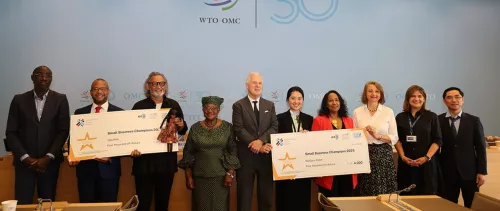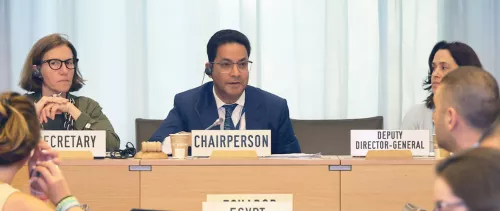
WTO members discussed on 21 February the importance of addressing the digital divide to improve the participation of developing and least developed countries in electronic commerce. In the second of a series of dedicated discussions to be held this year under the Work Programme on Electronic Commerce, members shared national experiences and challenges related to the digital divide and discussed the role the WTO can play in this area.
India presented its proposal on the role of digital public infrastructure in promoting e-commerce. The proposal outlines issues limiting access to and adoption of digital technologies. The proposal notes that a digital public infrastructure underpins digital transactions and enables more inclusive service delivery and innovation across public and private sectors. The proposal further outlines features that are important to obtain an ideal infrastructure.
Members of the Organization of Eastern Caribbean States (OECS) — Antigua and Barbuda, Dominica, Grenada, St. Kitts and Nevis, Saint Lucia and St. Vincent and the Grenadines — presented a proposal highlighting the use of e‑commerce and digital trade readiness in the OECS countries. The proposal suggests how the Work Programme can help developing countries and least developed countries (LDCs) address some of their e‑commerce challenges.
Singapore shared its experience on digital infrastructures, focussing on establishing a digital identity framework.
Other members outlined challenges faced in e-commerce, such as connectivity, affordability, lack of digital payment infrastructure, lack of digital skills and literacy, and lack of appropriate mechanisms for the protection of consumers, among other things. Members further highlighted the importance of inclusion in addressing the digital divide.
Reference was made to the WTO Aid for Trade initiative and technical assistance which can increase support to help developing countries and LDCs build their digital capacity. Members noted that the convening power of the WTO should be utilised to invite relevant international organisations and other stakeholders to share expertise on the topic.
Ambassador Usha Dwarka-Canabady, the facilitator of the E-commerce Work Programme and the moratorium, said: “Our conversation on the digital divide will not need to stop here. We need to identify together the targeted issues that we wish to pursue and delve deeper into the specific elements that we heard today, as well as into where the WTO could have an active role.”
The next dedicated discussion is scheduled for 22 March and will focus on legal and regulatory frameworks.


